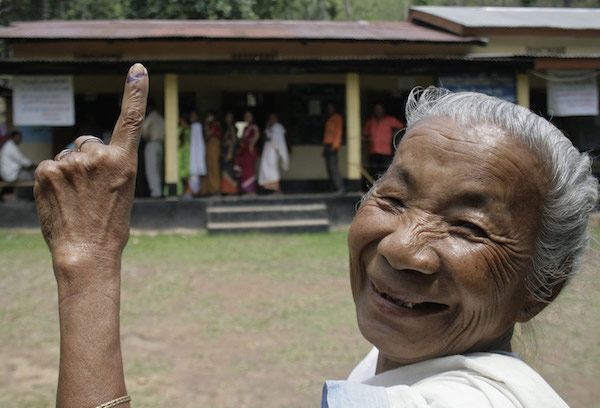
Concrete steps are needed to defuse crises that could disrupt India’s political and social equilibrium

“The authorities also need to be aware that as various State elections draw near, newer threats are likely to emerge. Among them are cyber threats. India is possibly the third most vulnerable country today from the point of view of cyberattacks. Many experts are of the view that as the digital economy expands, India will confront the specter of cyberattacks.”
As 2019 and the general election beckon, the situation within the country appears far from reassuring. Several events over the past few months seem to presage that there is worse to follow. Protests and agitations have a life of their own and underestimating their potential could be cause for grief. Hence, it might be worthwhile for the nation’s leaders to pay heed to the ancient Chinese proverb, “the wind sweeping through the tower heralds a storm rising in the mountain” and take anticipatory steps.
Lowdown on internal security
The authorities need to analyze why simultaneous upheavals are taking place on different planes across the country. Each day, a concatenation of events and situations are contributing to feelings of deep unease. Take internal security, for instance. The authorities may claim that the situation is stable, but the daily litany of violence tells a different story. Jammu and Kashmir is a good example where the situation has been steadily deteriorating. The past year has witnessed an increase in casualties, of civilians and security personnel, an upsurge in terrorist violence, a rise in cross-border terrorism and increased infiltration from Pakistan. Despite the surgical strikes by India, a palpable fear syndrome prevails in the areas bordering Pakistan.
Likewise, claims made latterly of the eclipse of the Maoist menace — there are reports of scores of Maoists having been killed in Maharashtra’s Gadchiroli district in end-April — are clearly unconvincing. Maoist violence is not so prevalent in areas where it was once rampant; while the kill-ratio of Maoists to security force personnel appears to have gone in favor of the security forces, the capacity of Maoists in carrying out selective violence has not been significantly blunted, especially in their strongholds in Chhattisgarh, Odisha, Andhra Pradesh, Telangana and Maharashtra. As an ideology-based militant movement, Maoism needs to be countered by a sustained ideological campaign in rural and urban areas, but this is nowhere in evidence.
Next is the growing specter of agrarian unrest. Over the past year, a series of protest movements by farmers have rocked the country. While the causes are varied, the basic issue remains the same, viz. the neglect of farmers and the agrarian community by those in authority. Large-scale protest marches by farmers such as the one in Maharashtra in March, evoke both concern and fear. More protests are in the offing. With cohesive leadership, the current peaceful agrarian protests could attain a dangerous dimension.
Dalit identity and concerns
An even bigger challenge confronts the nation today — on how to deal with the issue of Dalit “self-assertion”. This aspect was clearly manifest during the April 2 Bharat Bandh which was sponsored by different Dalit groups; its pan-India imprint was unprecedented. The bandh was to protest the judgment of the Supreme Court, amending the Scheduled Castes and Schedules Tribes (Prevention of Atrocities) Act. The outburst of violence, which resulted in some casualties and the destruction of property worth crores, went far beyond this aspect. There was and is no mistaking the pent-up resentment or the degree of mistrust.
Anger and resentment have been building up within the Dalit community for quite some time. Growing numbers of atrocities against Dalits in recent years, which thanks to modern communications systems and social media have gained critical publicity, are undoubtedly the root cause of the pent-up anger. Instances in 2016, such as Rohith Vemula’s death at Hyderabad University, and, separately, in Una, have been triggers for the explosion of anger and violence.
However, the recent outburst points to a new brand of Dalit “rejectionist politics” which should be a matter of utmost concern. Appeasement is no longer acceptable. Moderating or repealing cow protection laws will hardly matter or make a difference. More reservation in jobs is unlikely to assuage Dalit concerns. A group of alumni from the Indian Institutes of Technology have given up their jobs to form a political party to fight for the rights of the Scheduled Castes, the Scheduled Tribes and Other Backward Classes.
Violence against children
If the authorities have been found wanting or are being accused of their inept handling of the April 2 agitation, they are now being hauled over the coals for their inability to check the spate of incidents of rape across the country. The brutal assaults on young children have touched a raw nerve. Demands are being made to ensure that crimes of this nature end and that the administration sheds its helplessness and starts taking stringent action.
Today, the place names, Kathua (Jammu) and Unnao (Uttar Pradesh), have become synonymous with the “epidemic” of rapes. But sexual violence still continues despite public outrage and the administration is seen to be helpless in preventing it, which is beginning to create a crisis of confidence in the ability of the administration and the government to deal with the situation. Questions are being asked as the administration is unable to fulfil one of its most basic responsibilities — to protect the honor and the dignity of women and children. Mere condemnation of rape by those in authority will not do.
Cracks in the two pillars
Distinct from these issues, but equally worrisome, is the extent of disruption seen in the functioning of Parliament. A disruption of parliamentary proceedings is not new, but the near total washout of the Budget session has shaken the faith of the nation.
The view from the Treasury Benches that the Opposition is to blame for this has gained little traction. Most people believe that the responsibility to ensure the smooth functioning of Parliament rests equally, if not more, with the ruling dispensation, apart from the Presiding Officers of the two Houses. What the nation is demanding is a resolution of the impasse, and not the assigning of blame. A lack of demonstrable action is only adding to the sense of dismay.
The prevailing dissonance in the higher judiciary, the display of divisions within the highest court of the land, and the charges levelled against the Chief Justice of India by Opposition parties which are seeking his impeachment, are again highly disturbing. There has been no precedent for such a situation. The persistence of such trends is giving rise to serious concerns as to where the nation is headed.
Cyber concerns
The authorities also need to be aware that as various State elections draw near, newer threats are likely to emerge. Among them are cyber threats. India is possibly the third most vulnerable country today from the point of view of cyberattacks. Many experts are of the view that as the digital economy expands, India will confront the specter of cyberattacks. Given that it is already struggling to deal with threats such as ransomware and cryptojacking, India will need to tone up its strategic mindset and increase its homegrown capabilities expeditiously; a devastating cyberattack could undermine public confidence in an election year.
Finally, given the current resurgence in communal and caste aspirations, India cannot afford to overlook the danger of a rise in regional subnationalism, of which there are already some incipient signs. Such tendencies could gain a fillip, if as anticipated, the coming elections witness bitter electoral campaigns based on a variety of considerations that include caste and community.
It is not that solutions for all these problems fall within the purview of the authorities or the government. However, it is in the nature of things that the responsibility for situations tends to devolve on the government. Hence, it is important that the road to 2019 is paved with not only professed good intentions but also concrete steps to mitigate and “defuse” a succession of crises that have the potential to disturb the political and social equilibrium in an election year.
(The author is a former National Security Adviser and a former Governor of West Bengal)





Be the first to comment